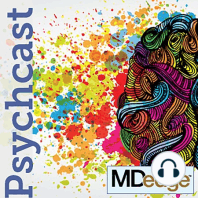23 min listen
Parkinson’s-related psychosis with Dr. Alberto J. Espay
FromPsychcast
ratings:
Length:
22 minutes
Released:
Jan 15, 2020
Format:
Podcast episode
Description
Alberto J. Espay, MD, MSc, conducts a Masterclass lecture on treating patients with Parkinson’s-related psychosis from the Psychopharmacology Update in Cincinnati. The meeting was sponsored by Global Academy for Medical Education and Current Psychiatry. Dr. Espay is professor of neurology at the University of Cincinnati. He also serves as director of the James J. and Joan A. Gardner Family Center Research Chair for Parkinson’s Disease and Movement Disorders. And later, in the “Dr. RK” segment, Renee Kohanski, MD, asks you to think about some of the complex issues tied to getting treatment for people who are both homeless and have serious mental illness. * * * Treatment of Parkinson’s-related psychosis Psychosis related to Parkinson’s disease (PD) is a common reason for hospitalization, institutionalization, and decline of patients with PD. The diagnosis of PD is required before the development of psychosis to diagnose patients with Parkinson's-related psychosis. Parkinsonism that appears after development of psychosis is Lewy body dementia. Many factors influence the development of psychosis in PD. Extrinsic factors include medical illnesses or metabolic derangement causing delirium with psychosis; nonessential dopaminergic medications such as ropinirole and selegiline; anticholinergic medications such as benztropine, amantadine, and bladder antispasmodics; and insomnia. The last resort for treatment of psychosis is levodopa because patients will experience motoric decline and loss of functioning. There are several mechanisms for psychosis to occur via the dopaminergic, serotonergic, and glutamatergic pathways; thus, three neurotransmitters – serotonin, dopamine, and glutamate – can be manipulated to treat psychosis. Quetiapine, clozapine, and pimavanserin are the three antipsychotics safe for use in Parkinson’s disease. Clozapine is infrequently used, because of the risk of neutropenia and required blood work monitoring, but evidence shows that the benefits usually outweigh the risks of motor decline. Quetiapine is commonly used, because it has a favorable effect on sleep and psychosis, but it negatively affects the movement disorder of Parkinson's disease. Pimavanserin (Nuplazid), the only medication FDA approved for hallucinations and delusions associated with psychosis in Parkinson’s disease, is highly selective for the 5-HT2A receptor as both an inverse agonist and antagonist. Primary adverse effects are peripheral edema and confusion, but overall the adverse effects profile is similar to that of placebo. In the pimavanserin clinical trials, a subset of patients worsened and experienced more visual hallucinations. In addition, pimavanserin can prolong the QT interval, so patients taking other QT-prolonging medications or who have cardiac comorbidities should be monitored with an EKG. Post hoc data analysis from as pivotal phase 3 study suggests that patients with cognitive impairment and dementia may receive more benefit from pimavanserin. * * * References Cruz MP. Pimavanserin (Nuplazid): A treatment for hallucinations and delusions associated with Parkinson’s disease. P T. 2017 Jun;42(6):368-71. Cummings J et al. Pimavanserin: Potential treatment for dementia-related psychosis. J Prev Alzheimers Dis. 2018;5(4):253-8. Huot P. 5HT2A receptors and Parkinson’s disease psychosis: A pharmacological discussion. Neurodegenerative Disease Management. 2018 Nov 19. doi: 10.2217/nmt-2018-0039. * * * For more MDedge Podcasts, go to mdedge.com/podcasts Email the show: podcasts@mdedge.com Interact with us on Twitter: @MDedgePsych
Released:
Jan 15, 2020
Format:
Podcast episode
Titles in the series (100)
Joseph Pierre: Dual Diagnoses part I: How do you treat patients with dual diagnoses. by Psychcast
